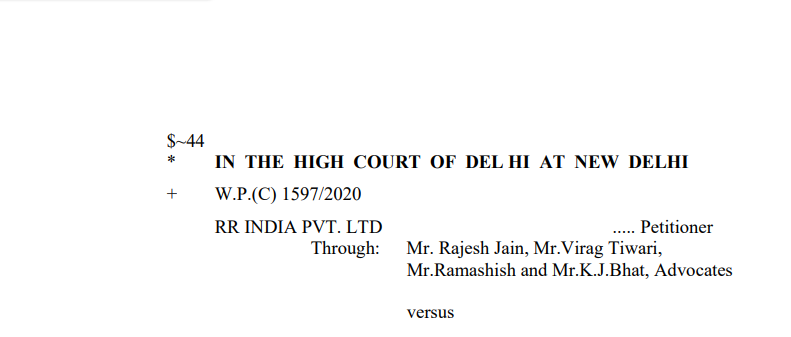Delhi HC in the case of RR India Pvt Ltd Versus Union of India
Table of Contents
Case Covered:
RR India Pvt Ltd
Versus
Union of India
Facts of the Case:
Grievance of the petitioner is that the respondents, in pursuance of the search operation which was conducted between 01.11.2019 and 30.11.2019, at various places of the petitioner, under Section 67(2) of the CGST Act, proceeded to issue provisional attachment orders under Section 83 of the CGST Act dated 02.12.2019 and 03.12.2019, which have also been impugned in the present petition – petitioner states that bank accounts have been attached under Section 83 of the Act; that they had filed objections to the original attachment, which have been rejected vide order No. 01/2020 dated 06.02.2020, only on the ground that the petitioner had not moved under Rule 159(5) of the CGST Rules within a period of 7 days of attachment – Petitioner further submits that under the CGST Act or Rules, there is no provision which mandates the filing of objections to provisional attachment within 7 days and that no consequence of delay in filing objections is provided; that the respondent does not suffer any adverse consequence on account of delay on the part of the objector in moving the objections which is beyond the period of 7 days of the date of the provisional attachment – Counsel for Respondent Revenue submitted that petitioners are bound to comply with the letter of the law and since sub-Rule 5 of Rule 159 stipulates that the person whose property is attached, may within 7 days of attachment under sub-Rule (1), file an objection, the petitioner ought to have filed the same within the aforesaid stipulated period, however, since, admittedly, the objections were preferred beyond the period of 7 days, respondent were bound to reject the same.
Observations:
It is clear that the period of 7 days prescribed in Rule 159(5) of CGST Rules, 2017 is a directory and not a mandatory period, therefore, on account of delay on the part of the objector, if he prefers his objections beyond the period of 7 days, the objections cannot be rejected on the ground of limitation – No consequence is prescribed either in the Act or in the Rules to say that if the objections are not preferred within 7 days, they shall not be entertained – Moreover, it is the objector who would suffer adverse consequence on account of delay on his part in raising the objections – The respondents do not suffer any adverse consequence on account of delay, if any, in moving the objections – Bench, therefore, holds that the period of 7 days prescribed in Rule 159(5) of the CGST Rules for moving the objections to the provisional attachment is merely directory and not mandatory – Objections raised by the petitioner, therefore, could not be rejected on that ground alone – Order No. 1/2020 dated 06.02.2020 is accordingly set aside and the proceedings are remanded to the authority concerned for passing a fresh order on the merits of the objections – Officer concerned is directed to pass a fresh reasoned order within two weeks – Petition disposed of: High Court [para 9 to 11]
The Decision of the Court:
Having heard both the learned counsels, it is clear to us that the period of 7 days prescribed in Rule 159(5) is a directory and not a mandatory period. Therefore, on account of delay on the part of the objector, if he prefers his objections beyond the period of 7 days, the objections cannot be rejected on the ground of limitation. No consequence is prescribed either in the Act or in the Rules to say that if the objections are not preferred within 7 days, they shall not be entertained.
The decision in Sambhaji (supra) is clearly attracted to the present case. Moreover, it is the objector who would suffer adverse consequences on account of delay on his part in raising the objections. The respondents do not suffer any adverse consequence on account of the delay, if any, in moving the objections. We, therefore, hold that the period of 7 days prescribed in Rule 159(5) of the CGST Rules for moving the objections to the provisional attachment is merely directory and not mandatory. Objections raised by the petitioner, therefore, could not be rejected on that ground alone.
We accordingly set aside order No. 1/2020 dated 06.02.2020 and remand the proceedings back to the concerned authority for passing a fresh order on the merits of the objections. The officer concerned shall proceed to pass a fresh reasoned order within two weeks from today.
Petition stand disposed of in the above terms.
Order dasti.
Related Topic:
Karnataka AAR Ruling in the case of Airbus Group India Private Limited
Read & Download the full Decision in pdf:
 ConsultEase Administrator
ConsultEase Administrator
Consultant
Faridabad, India
As a Consultease Administrator, I'm responsible for the smooth administration of our portal. Reach out to me in case you need help.








